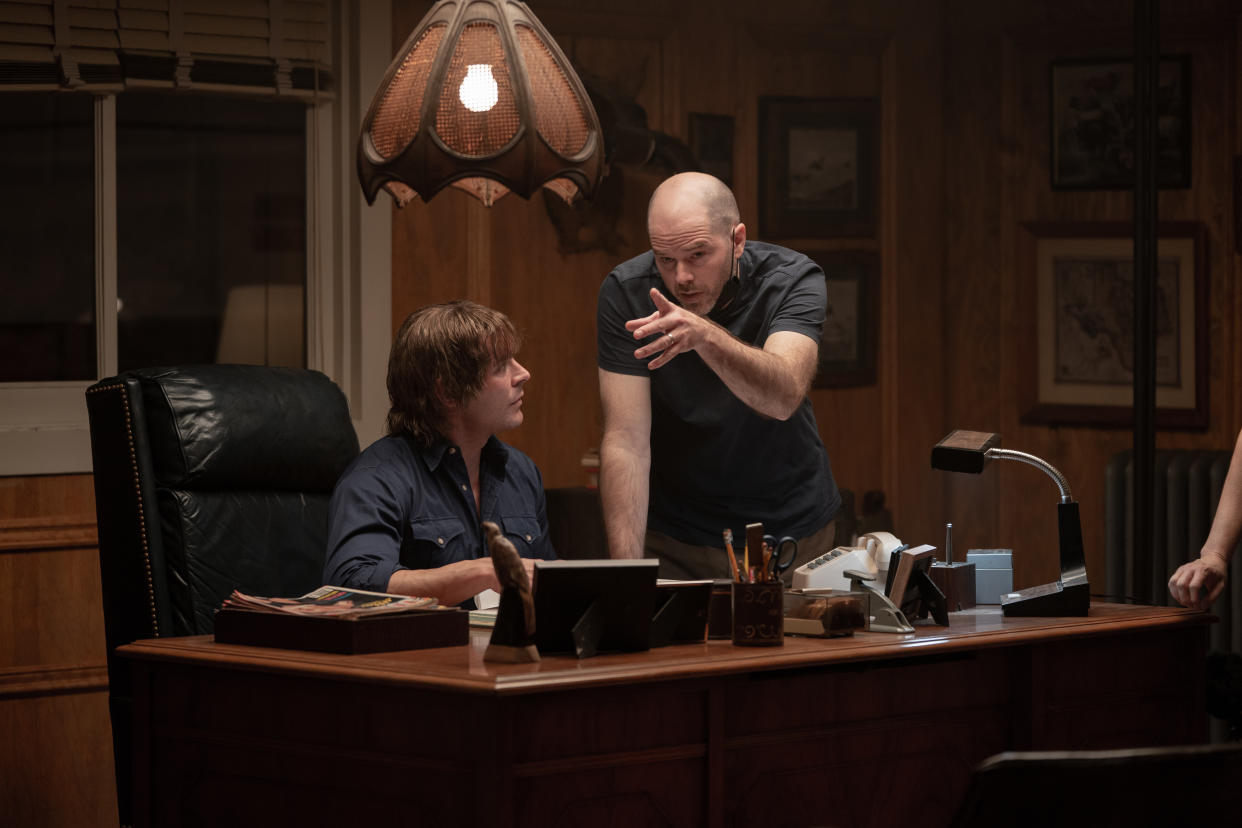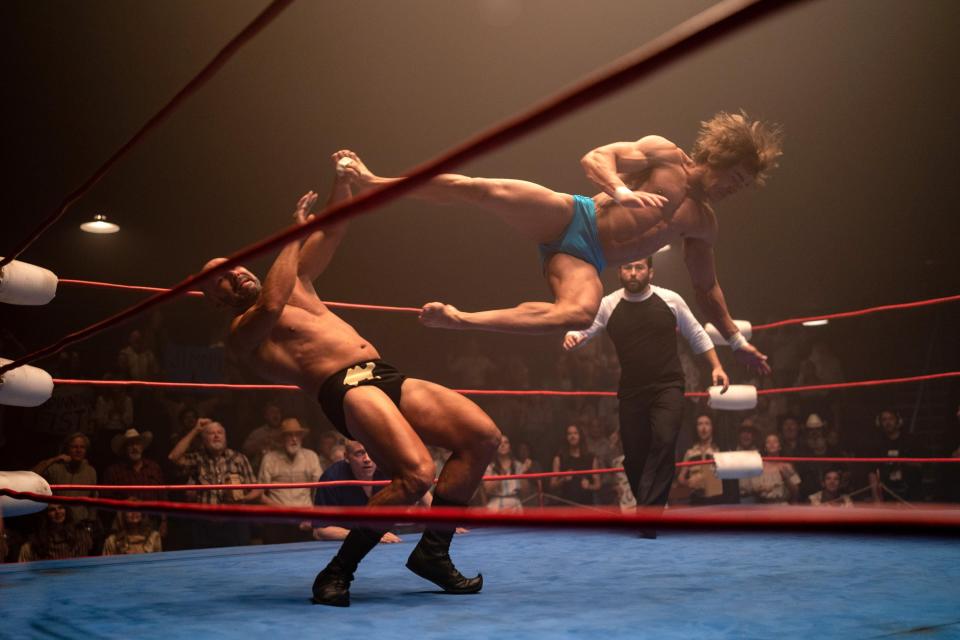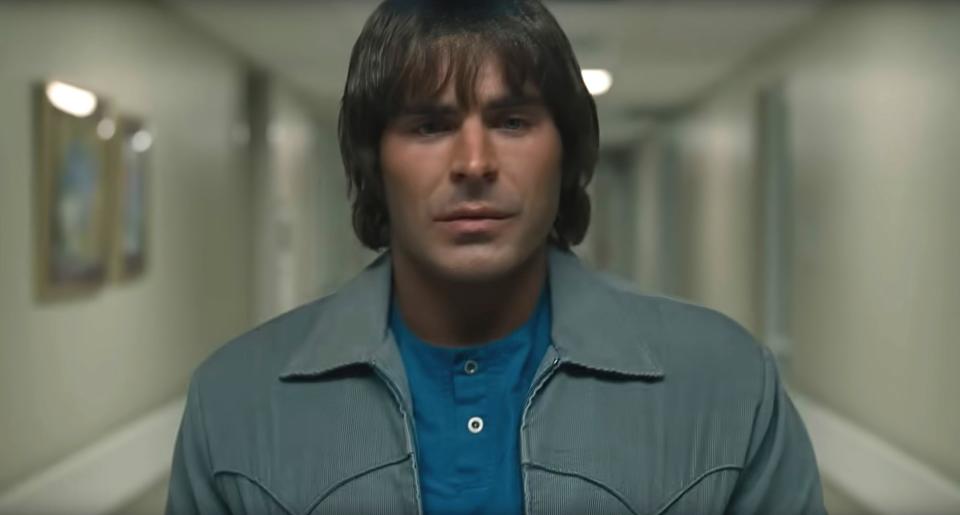Sean Durkin Learned Lessons on His Lost Janis Joplin Biopic That Told Him How to Make ‘The Iron Claw’

- Oops!Something went wrong.Please try again later.
- Oops!Something went wrong.Please try again later.
- Oops!Something went wrong.Please try again later.
- Oops!Something went wrong.Please try again later.
- Oops!Something went wrong.Please try again later.
- Oops!Something went wrong.Please try again later.

Sean Durkin’s “The Iron Claw” is less Christmas crowdpleaser than family downer, but this skillfully directed portrait of the tragic rise, fall, and resurrection of the Von Erich wrestling family dynasty should be a holiday hit for A24. Its stacked cast includes a Hollywood favorite with a beloved risen-from-the-ashes story of his own (Zac Efron), at least one super hot name right now (Jeremy Allen White), and a fast-rising indie darling on his way to becoming a household name (Harris Dickinson).
They, along with newcomer Stanley Simons, play the quartet of Von Erich brothers beset by misfortune and heroic episodes of prevailing throughout their 1980s wrestling careers, under the controlling clutch of their father’s (Holt McCallany) merciless management style and cruel kind of love. Maura Tierney, meanwhile, plays their mother as a woman numbed by grief amid the successive self-inflicted deaths of her children. To this day, Kevin Von Erich (Efron) is the only member of the original nuclear family still with us, all of whom faced up to a Kennedy-level family “curse” in which four of Kevin’s brothers, pushed to the brink, all killed themselves.
More from IndieWire
'The Nuttiest Nutcracker' Dishes Out Food Puns Galore in Rancid Christmas Eve Adventure from 1999
Michael Mann Says 'Guardians of the Galaxy' Had a 'Really, Really Well Done Story Structure'
It may be hard to believe that Durkin, the director of quiet, sensitive indies like his Sundance breakout sensation “Martha Marcy May Marlene” and “The Nest,” grew up a deep fan of wrestling himself. “The Iron Claw” is his expression of that fandom, and of a sport many of us associate with toxic machismo, of men who can’t and don’t cry despite enduring all the pain. This tearjerker of a movie is his first feature since “The Nest,” a brilliant class drama released to muted appreciation in the deep pandemic, and only one of three features to his name despite behind-the-camera credits on TV from “Dead Ringers” to “Southcliffe.” Created with Josh Mond (“James White”) and Antonio Campos (“Christine”), his company Borderline Films has been an incubator for talent ranging from Nicolas Pesce (“Eyes of My Mother”) to its own founders and their dark, socially probing indies that themselves have examined masculinity’s tenuous place in the culture. (Borderline isn’t part of the equation for this film.) Other projects that fell off for Durkin, like a planned Janis Joplin biopic starring Michelle Williams, proved instructive for how to approach the true story of “The Iron Claw.”
Durkin here works on his biggest scale, with a budget of $20 million. But expectations in terms of “The Iron Claw” getting made at all meant he had to be prudent about what to include from the Von Erich family history so as not to overwhelm the audience with misery. Fritz (McCallany) and Doris (Tierney) Von Erich actually had six children. Their first son, Jack, alluded to offscreen, died in a drowning accident in 1952. Chris, the youngest of the brood, killed himself in 1991 but is not included at all in the movie, which instead centers on Kevin, David (Dickinson), Kerry (White), and Mike (Simons). “The Iron Claw” focuses on the four brothers’ enormous success in the 1980s, and as Durkin told IndieWire, Chris could not feature in a film already based so heavily on tragedy. The filmmaker worked closely with the real Kevin Von Erich in pre-production and post, and Kevin, now a retired professional wrestler, understood those necessary changes.
As Durkin explained, he also did not encourage his actors to make any specific physical transformations, though you’ll notice a swole-beyond-belief Efron whose metamorphosis was entirely his own doing. He trained for hours a day and dieted to the extreme to gain 15 pounds of muscle. It’s an Efron performance like no other in a movie that’s confidently directed to match the lead’s own fierce dedication to the role. Below, Durkin talks to IndieWire about “The Iron Claw.”
This conversation has been edited and condensed for clarity.
IndieWire: You explicitly avoided contact with Kevin Von Erich and his family while writing the script. When did you initiate contact, and why?
Sean Durkin: What really drew me and became the core of the film was watching these extensive interviews Kevin had done. He spoke so openly and honestly and at length about his family’s trauma, his own personal experience, stories of his upbringing, stories of his own considered suicide. That openness gave me a sense of who he was and why he survived. Because he’s open and able to look at his emotions, he was able to survive, whereas others were not.
I felt like there was enough to go on publicly. I’d had a situation on another project where I got very close to people who were subjects of the movie and were close to the central subject, and it got a little messy in terms of when they’d read the script. If you weren’t showing their side of the story as they told it to you, they were upset about it.
As a writer, I wanted to have some distance. I loved this family, and I loved Kevin, and I didn’t want to love him even more because I knew there were a lot of difficult decisions to make. Even with best intentions, keeping that distance can be difficult when you’re thinking about someone’s feelings. It was really when I got to the core of the script and realized what I was making and could stand behind “this is why I made these decisions” that I felt comfortable to go and reach out to him. I was right. I met him and I loved him even more, but in our first conversation, the first thing he said was, “The thing I care most about is that you show how much my brothers and I loved each other.” I was able to say that, and that is the core of the movie. If I’d met him a few years earlier, and he’d said that, I might have subconsciously tried to make it that way. But I was able to get to something on my own that registered with him.
The project you’re referring to that seemed to inform “The Iron Claw” is the Janis Joplin biopic announced a decade go. That one didn’t work out.
When I talk about that, that wasn’t a major thing and certainly not the reason why it fell apart. But it was a thing that on an emotional level I went through. I got very close with people and there was some fallout over using the story. It made it all more complicated, which is why I stayed away from it this time.
I’m disappointed that one didn’t go. It seems like everyone has trouble realizing that story.
There’s very clear reasons for that. Nothing to do with Janis.

Was there ever a draft of the “Iron Claw” script where Chris Von Erich was included?
He was in it for a long time, not just a draft. For years. I wrote the script for seven years and Chris was part of it for maybe five of those years. It’s really hard on a human level to look at them as characters on the page because they were real people. But at some point as a writer and a filmmaker, you have to say, if I step away and look at it as characters on a page and look at it as a film, there’s just a repetition to the deaths of Kerry, Mike, and Chris, that they all died in the same way, where they either took a gun or pills out into a field and killed themselves. To try and fit the story, which had so much more tragedy even [besides] than that — another tough one was that David was a parent and his daughter died when she was a year old. There’s just so much tragedy in this family that a film just couldn’t sustain it. I ultimately took it out because it seemed like it was the difference between the film getting made or not. [Including Chris] was clearly throwing off the rhythm of the film, the weight of the film, the focus of the film, which was trying to be about Kevin’s survival but was getting lost in the amount of tragedy. I had to find that balance to make the screenplay work on a level that made it a workable film.
How did Kevin feel about the changes?
We had a lot of conversations about the fact that no film is ever going to capture someone’s full life. There’s not a biopic ever made that’s done that. When you’re making a film, it’s not going to be the person or the life: It’s going to be a filmmaker’s version of that, and it’s about getting to the truth of something as opposed to trying to recreate something. Especially with a family this epic. You couldn’t fit this full story into 10 hours of television.
Was Zac Efron the first person you approached about playing Kevin?
Zac was the first person I met with. When I met him, he’s just got this kindness, this sweetness to him, that I knew Kevin needed. I don’t think that’s a quality an actor can act if they don’t have it — in a silent way, there has to be a kindness in your eyes and a sweetness in your heart. It’s not easy to perform if you’re just not present in it. And so I just felt it from him right away. It all came together in that sense.
You didn’t encourage any particular physical transformation from your actors, which they all did on their own. What would you have done if they showed up and not have been transformed in some way?
If someone showed up and hasn’t done any prep work, then they’re not the right actor. So it’s the same as if they show up and don’t know their lines, that would be ridiculous. But we had conversations, I took their lead, they know their own bodies, they know what feels right, they know where they can go, and the thing I didn’t want to do was put in their head something they had to hit that was impossible for them. I am not interested in that.
There’s very few humans in the world that are the size of Kerry Von Erich. That man was one of the most incredible athletes to walk on this earth, and he was a giant, and there’s not people, nevermind actors… So I had already dropped things like that. It’s not about matching anything, but it was about the silhouette of the three of them. It was about finding the costume and the world and it was just making a feeling. I don’t know what I would’ve done if no one trained, but I knew they were. And I really focused on the wrestling. I really focused on getting the wrestling and I knew the rest would follow because I knew they were the right actors for the characters.
Zac Efron spoke openly in the past about over-training for “Baywatch” and its effects on him. Were you worried about his mental and physical state?
We talked about that upfront. The message of this movie is to not embrace an idea of what someone should be or what masculinity is or what strength is. So absolutely, we talked about that and we were aware of that, which is a part of why I took the approach I did. That said, for him, it was his way in. He had that experience and was able to use it here where even though he got huge, [he could] share it. I think it was a very healthy process. It seemed to be a very healthy process for him as his way into the character and to get into the rigorous life of a wrestler. He used it here very much as a journey as an actor into this character as opposed to doing something for the physical sense of just to appear a certain way.
Why cast Stanley Simons, an unknown actor, in the role of Mike?
I came up in casting. It was my first job, and I was a casting assistant for years, and I used to work running camera and casting sessions in New York, and I would see all these amazing kids coming into rooms or young actors not getting roles. I said, if I get to make films, I’m going to cast all these people. I’m going to give them a shot. And so when I made “Martha,” I cast all of those people that I saw in the room not getting roles — Chris Abbott, Julia Garner, Lizzie Olsen — and wanted to continue to do that. In “The Nest,” it was Oona Roche. And here with Stanley, sometimes there’s room for more than one and sometimes there’s room for one, but it’s something I feel very passionate about. My casting director, Susan [Shopmaker], who I used to work for, is particularly good at it. Stanley was just a gem. Also, see Stanley in audition, you can’t not cast him. He’s just amazing.

This movie is a tearjerker. Were you making a statement against the idea that “grown men don’t cry”? My relationship to this particular sport is mostly with the wrestlers who bullied me in school.
Yes, absolutely. I was also bullied as a kid, not by wrestlers. When I reflect on those boys, I knew that their fathers were not treating them well at home, for instance. [I was] looking at those questions, those silly old tropes about what it means to be a man in toughness and hiding your emotions. That was what I wanted to tackle here and look at. It’s something I feel very strongly about — questioning masculinity and values of masculinity and the nonsense of those old ideas. It comes back to Kevin. Kevin survived because he was able to look at his pain and talk about it openly. For me as a kid, I found my voice through wrestling.
How so?
I was shy. I was always interested in that emotion, of with this family in particular. It applies to a lot of the wrestling community, especially of that time where [there was] obviously no conversation about mental health back then, but there’s even more than that: There’s no expression of emotion. These guys are in the ring showing their absolute heights of pain and glory and having all these huge emotions, but they get backstage, and they’re showing nothing. They’re not talking about how much it hurts or that they feel empty from being on the road 300 days a year. They just keep going and keep going. There’s no protection of that. There’s no looking at those feelings. I wanted to do something that looked at those feelings and the impact of not looking at those feelings.
Were there any injuries on set?
No, it was very safe. Wrestling looks reckless, but it’s very caring. There’s a real agreement when you step into a ring with someone that a part of the success is like if you’re going to win or lose. And it’s like if you’re going to lose, you’re going to lose great, and you’re going to sell your losing. People are either going to be happy that you lost or they’re going to be devastated that you lost. It’s your job to sell them on whatever that emotion is you want them to have. There’s a real teamwork and choreography, and there’s a real respect and safety element when Zac’s jumping off the top rope and risking his body, the person catching him, it’s all on them. It’s all on the person who’s going to catch him and fall and take him to the ground safely. There’s a real beauty in it and care. So it’s all very safe. We had an amazing wrestling team. We had an amazing stunt team, and it was a very protected place.
Did you have any impulse to soften Fritz? He’s pathological in his managing of his kids.
This might be the softened version. He certainly loved his kids. I believe he does all this with love. He believes it is. Anyway, it’s his version of it. I hope that comes across. I think he thinks genuinely that he’s doing the best thing for his boys. He loves being with his boys and he enjoys being with them, and that was important to show. But I also don’t want to soften him with a modern lens. He was a man of a time and a place. Being truthful to that was really important. So my hope was that both things will come across.
A24 releases “The Iron Claw” in theaters on Friday, December 22.
Best of IndieWire
2023 Emmy Predictions: Who Will Win at the Primetime Emmy Awards?
2023 Emmy Predictions: Outstanding Documentary or Nonfiction Special
2023 Emmy Predictions: Outstanding Documentary or Nonfiction Series
Sign up for Indiewire's Newsletter. For the latest news, follow us on Facebook, Twitter, and Instagram.

